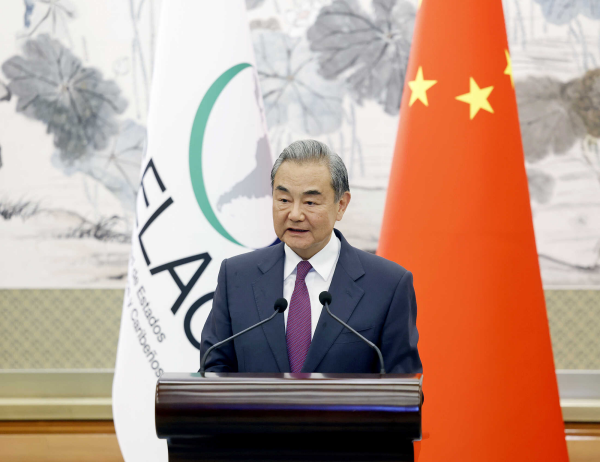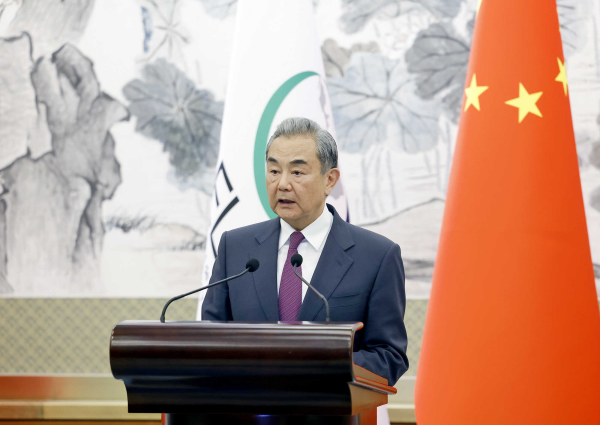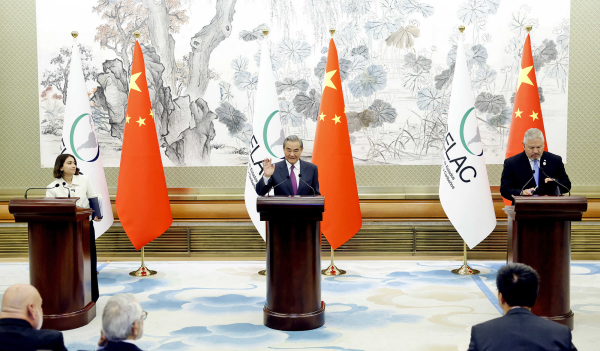
The People’s Republic of China


On May 13, 2025, Member of the Political Bureau of the CPC Central Committee and Foreign Minister Wang Yi met with the press and answered questions alongside the foreign ministers of Colombia and Honduras, the co-chairs of the Community of Latin American and Caribbean States (CELAC), who also attended the Fourth Ministerial Meeting of the China-CELAC Forum.
In response to a reporter's question about the highlights and outcomes of the meeting, Wang Yi stated that the most notable highlight was President Xi Jinping's comprehensive summary of the successful experience of the development of China-LAC relations and his announcement of the launch of five programs of Solidarity, Development, Civilization, Peace, and People-to-People Connectivity, which have charted the course for building the China-LAC community with a shared future.

Wang Yi said that the Solidarity Program aims to consolidate the political foundation. Solidarity means strength. China will work with LAC countries to support each other on issues bearing on their respective core interests. In the next three years, to facilitate exchanges on national governance experience, China will invite 300 representatives from political parties of CELAC member states every year to visit China. China supports the efforts by LAC countries in increasing their influence on the multilateral stage. China will work with LAC countries to firmly safeguard the international system with the United Nations at its core and the international order underpinned by international law, and to speak with one voice in international and regional affairs.
The Development Program aims to promote common prosperity. Development is of paramount importance. The two sides should foster greater synergy between their development strategies, bolster cooperation in such areas as infrastructure, agriculture and food, energy and minerals, clean energy, 5G telecommunications, the digital economy and artificial intelligence, and jointly implement the Global Development Initiative. China will increase imports of quality products from LAC countries, and encourage Chinese enterprises to expand investment in the LAC region. China will provide LAC countries with a RMB credit line.
The Civilization Program aims to deepen mutual learning among civilizations. The diversity of civilizations is what makes the world as it should be. China and LAC countries will implement the Global Civilization Initiative, hold a conference on China-LAC inter-civilizational dialogue, and strengthen exchanges and cooperation in cultural heritage fields such as joint archaeological projects, and conservation of ancient and historic sites. Both sides should also carry out collaborative studies of ancient civilizations, so that the civilizations of China and LAC countries will flourish with new vitality through exchange and mutual learning.
The Peace Program aims to maintain regional stability. Both China and LAC countries share a commitment to the vision of common, comprehensive, cooperative and sustainable security. China supports the Proclamation of Latin America and the Caribbean as a Zone of Peace and the Declaration of Member States of the Agency for the Prohibition of Nuclear Weapons in Latin America and the Caribbean. China is ready to work with LAC countries to implement the Global Security Initiative and cooperate more closely in disaster governance, cybersecurity, counterterrorism, anti-corruption, and narcotics control.
The People-to-People Connectivity Program aims to enhance people-to-people friendship. China-LAC cooperation originates from the people's expectations, meets the people's needs, and benefits the people's well-being. In the next three years, China will provide CELAC member states with 3,500 government scholarships, 10,000 training opportunities in China, 500 International Chinese Language Teachers Scholarships, 300 training opportunities for poverty reduction professionals, and 1,000 funded placements through the Chinese Bridge program. China will initiate 300 "small yet smart" livelihood projects, actively promote vocational education cooperation programs such as Luban Workshop, and support CELAC member states in developing Chinese language education. To facilitate people-to-people exchanges, China has decided to implement a visa exemption for five LAC countries as the first step, and will gradually expand this policy coverage.




